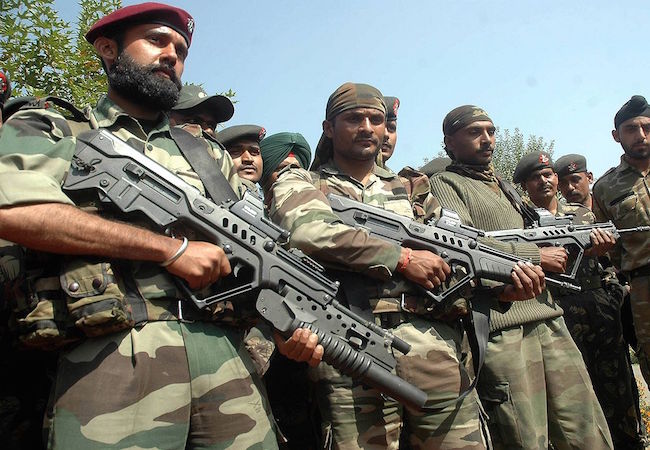Evolution of Indian nuclear doctrine from NFU to preemption

By Sher Bano
India’s obscure nuclear doctrine of ‘No First Use’ (NFU) had evolved over the years since it was first declared in 1999 by NSAB’s (Nuclear Security Advisory Board) in the ‘Draft Nuclear Doctrine’ (DND) that forms the very basis of the official Indian nuclear doctrine. Subsequently, in 2003 after a review by the Cabinet Committee on Security (CCS) the DND had emerged as India’s official nuclear doctrine. However, the later developments are quite evident that India has shifted its nuclear posture from NFU to preemption. In August 2019, a statement made by Mr. Rajnath Singh (Indian Defence Minister) made headlines amid rising tensions between India and Pakistan, the two arch-rivals in South Asia. This was an assertion of India’s likely shift from its long doubted NFU policy. This has further exposed the pretense of India‘s NFU policy, to which Pakistan has never given any credence. This shift in Indian nuclear doctrine seems to be purely Pakistan centric. Such an Indian shift is further evidence of India’s focus towards nuclear war-fighting rather than maintaining deterrence. In the wake of the evolved tensions in the region, India’s offensive nuclear posture of preemption would have dire implications for the strategic stability of South Asia.
Over the period, various statements by the Indian government officials and prominent academicians have raised serious concerns over India’s adherence to the NFU policy. In 2010 Shivshankar Menon, the then National Security Advisor of India stated that according to Indian nuclear doctrine NFU policy is meant only for non-nuclear-weapon states. Hence, it implies that using a nuclear weapon could be a resort against nuclear-weapon states, particularly against Pakistan. Later on, in 2016 Manohar Prakar the then Indian Defence Minister questioned “Why do lots of people say that India is for no first use? Why should I blind myself?” Moreover, in 2017 a prominent Indian scholar, Vipin Narang while speaking at the conference at Carnegie stated that India would not let Pakistan go first. These assertions are quite evident that in a crisis, India might take a nuclear first strike against Pakistan. Such drifts in Indian policy have further enhanced Pakistan’s threat perception vis-à-vis India. Similarly, Pakistan would be further compelled to maintain a credible nuclear deterrence posture to overcome India’s offensive nuclear posturing.
India’s pursuit of offensive nuclear capabilities further reveals its aspirations of a pre-emptive nuclear strike against Pakistan. This, for instance, is further evident from the fact that India has been involved in developing ground-based and space-based surveillance, reconnaissance, and intelligence capabilities, and new precision weaponry for the last few years. These would further embolden India to take any move toward pre-emption or first use. In the same vein, India’s adoption of Pakistan specific policy of first use would likely result in the lowering of the Indian nuclear threshold. This might bring serious implications for Pakistan’s existing nuclear deterrent posture which covers a broad spectrum of threats coming from India including its conventional advantage. It would further generate an unnecessary arms race in the region and might force Pakistan to further revisit its doctrinal and force posture vis-à-vis India’s notions of preemptions. The likelihood of India’s shift towards preemption would also mean that India’s nuclear weapons would be kept in the state of readiness. This would also increase the risk of unauthorized or accidental use of Indian nuclear weapons. Such a scenario would likely create a complex security dilemma for Pakistan, thus undermining the deterrence equilibrium in South Asia, primarily ensured by Pakistan’s nuclear capabilities.
In recent years, India’s massive naval buildup is also aimed at maintaining an offensive sea-based nuclear posture. In this regard, India’s acquisition of SSBNs (nuclear-powered submarines) is quite significant since along with the assurance of second-strike capability, they are also meant to be used to launch a multitude of nuclear weapons. Other than that, India has been maintaining an operational BMD (Ballistic Missile Defence) system; also, it would have the most advanced anti-missile systems like the Russian S-400 in its inventory very soon. Hence, having been assured that it would be protected against any counter-strike by Pakistan by its BMD systems; India might potentially launch a land, sea, or air-based pre-emptive strike against Pakistan. This would create a false sense of security among the Indian decision-makers and they might act aggressively in the time of crisis. Pakistan needs to keep a close eye on India’s shifting nuclear policy to counter the probability of a nuclear first strike initiated by India. Pakistan has already developed MIRV (Multiple Independent Re-entry Vehicle) capable short and medium-range ballistic missiles. Apart from that Pakistan has also developed a sea-based delivery system such as Babur-3, a Submarine Launched Cruise Missile (SLCM) which is aimed at ensuring a credible second-strike capability. These would serve as a reliable and credible deterrent against Indian notions of preemption.
Hence, at the present, the assertions of Indian officials to abandon the long doubted NFU policy and a move towards pre-emption is mere irresponsible and belligerent behavior. India in its pursuit to become a regional hegemon would destabilize the already conflict-prone South Asian region by further provoking an arms race. Pakistan needs to further increase international pressure by highlighting India’s aggressive and irresponsible nuclear posturing. The world needs to know that India’s shift from NFU is merely reckless and dangerous. On the other hand, Pakistan also needs to ensure its safety by further enhancing its assured second-strike capability and acquiring advanced BMDs while staying within its existing posture of minimum credible deterrence.
Sher Bano is a Research Affiliate at the Strategic Vision Institute (SVI), a non-partisan think-tank based out of Islamabad, Pakistan.




